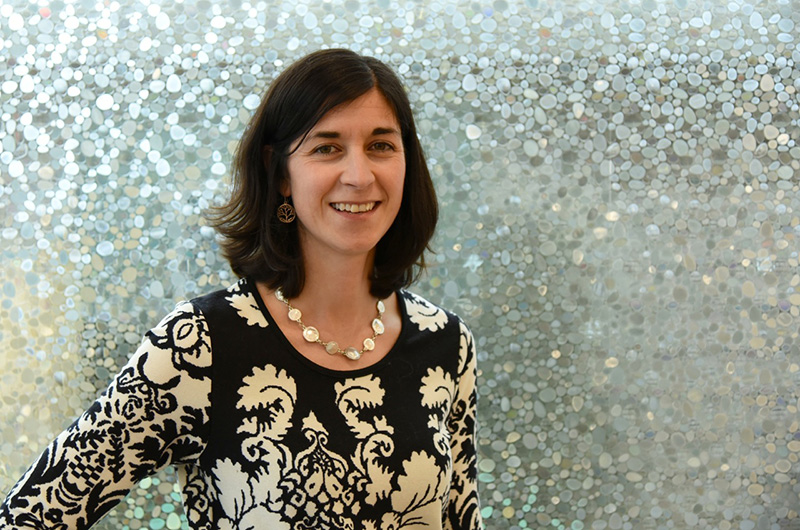THIS BRIGHT BEAUTY by Emily Cavanagh, Lake Union Publishing, March 2018, 300 pages, softcover $14.95.
Emily Cavanagh’s first novel, The Bloom Girls, had at its heart a touching examination of the nature of sisterhood, particularly as it reacts to one external stress after another. Her new book, This Bright Beauty, once again concentrates on sisterhood, but in this case the stress is intensified because it’s internalized: the book’s two sisters, Francine and Charlotte Weaver, are bound even more tightly than most sisters because they’re identical twins. But they’re as deeply divided as they are connected, because Lottie has suffered her whole life from bipolar disorder.
Ms. Cavanagh teaches English at the Martha’s Vineyard Public Charter School and one marvels at her output of late, publishing two deeply felt books in two years — The Bloom Girls was published in March of 2017; This Bright Beauty in March of 2018.
Lottie not only suffers from bipolar disorder but is also proud, willful, and impulsive — and it’s a hard combination. She’s constantly oscillating between accepting her limitations and rebelling against them, and she’s a bad caretaker of herself: she hides her lapses and fibs so routinely about her corner-cutting that it becomes a habit even she herself can’t trust.
“When you’ve been tricking people your whole life,” she reflects, “it’s amazing how easy it is to trick yourself.” It doesn’t stop her from having a loving and fairly stable relationship with her boyfriend Whit, but ultimately the rock in her turbulent life is her sister Franci, who’s always there to fix her problems and pull her back from the abyss. Finally this wears on Franci to the point where she moves across the country to start a life of her own, separate from the sister she shakily believes will be fine with the help of a caring boyfriend and a steady regimen of anti-depressant medications.
But Lottie is maddeningly inconsistent with those medications, as she herself admits: “Franci and Whit have never understood why I go off the medication. It is a hard thing to explain, an unfair thing to try to rationalize, as they were often the ones who were left to pick up the pieces of my shattered self and put me back together.”
Ms. Cavanagh describes this cycle of wellness and lapse effectively, with a clear-eyed sympathy that never crosses into treacle. Her descriptions of how Lottie experiences her own condition are equally affecting and believable. Lottie divides the moments between “the Black,” when her illness is sucking her down into madness and mania, and “the White,” when she’s feeling the false euphoria that can lead to so many bad decisions: “The White is power. It’s like flying. It’s like living the way I’ve always wanted to live. In the White, I can do anything, be anything or anyone.”
When one such bad decision lands Lottie in the hospital, Franci is once again called upon to come to the rescue. And when she returns to Lottie’s life, she gets the shock of a lifetime: without telling her, Lottie has made use of an anonymous sperm donation and had a child, a little daughter named Mia.
Both Franci and especially Whit view this as an act of almost malevolent recklessness. Whit reminds her over and over that she can scarcely take care of herself and is in no position to try taking care of a baby girl — essentially, that she’s unfit to be a parent.
“You make promises that you can’t keep,” he tells her. “You’ll hurt her over and over, and I’ll come to despise you.”
For Franci, this new reality is even more upsetting, because while Lottie is recuperating from her accident, the weight of caretaking Mia and keeping everything from falling apart falls squarely on Franci’s shoulders. It’s a burden she carried for so long before escaping that it feels almost natural — and it has a seductive power that at first seems at odds with its strain. Franci occasionally has to force herself to recall that it’s all a temporary crisis.
“Being here, in Lottie’s kitchen with her daughter and former lover, it fit too easily, too comfortably,” she thinks at one point. “I reminded myself of my own husband and children waiting for me on the other side of the country, my own life, so very different from this one.”
Ms. Cavanagh handles these complicated and extremely nuanced family matters with a sure-handed confidence. Her characters are entirely believable — their doubts, dialogue, and debates with each other don’t have any of the stilted quality that so often accompanies family-oriented fiction. She even manages to work in a bit of humor from time to time. “People in New England assumed that everyone in New England assumed that everyone in Berkeley grew their own wheatgrass and fueled their cars with vegetable oil,” Franci drolly observes at one point. “One girl I met had asked me if it was true that you were allowed to go to class topless at Berkeley.”
But mostly This Bright Beauty is serious business, a story of the conflicting pulls of a deadly mental disorder and the family bond between sisters. Ms. Cavanagh deploys her increasingly-dramatic plot twists with a polished assurance that will keep readers turning pages to a conclusion that’s both heartwarming and bittersweet. And if some of those readers have ever dealt with the tragedy of bipolar disorder — either in themselves or in a family member — they’ll find it immediately, sympathetically portrayed here.








Comments
Comment policy »